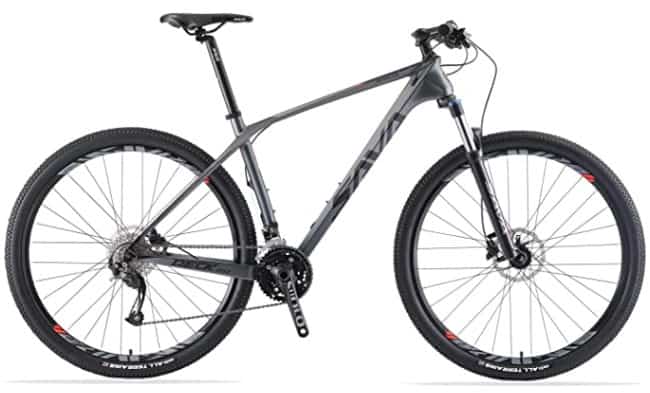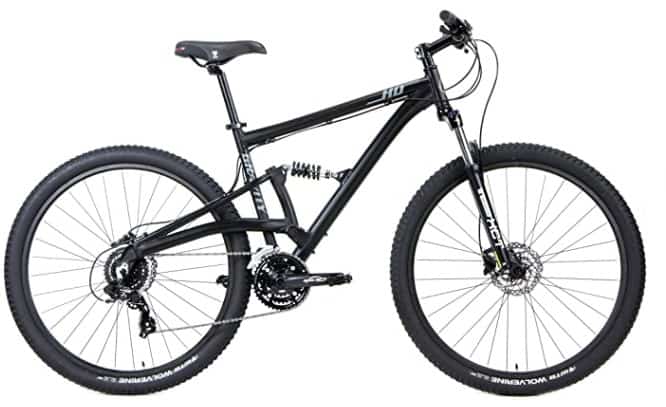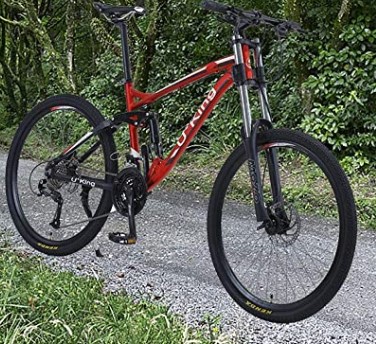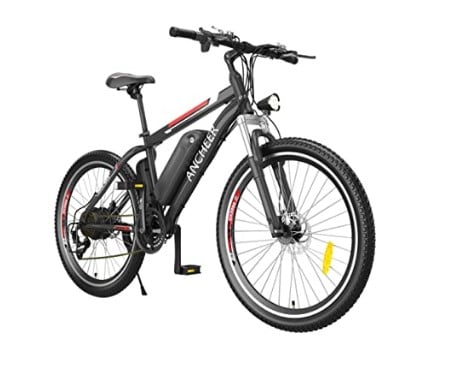Given that mountain bikes are designed for the rough off-road, they are expected to come in heavy-duty construction. But does that mean that all mountain bikes are heavy? How much does a mountain bike weigh?
Most mountain bikes average 26-35 pounds, primarily depending on suspension type and bike category. Expectedly, hardtail mountain bikes are lighter than full-suspension mountain bikes. In that case, while hardtail MTBs average 26-30 pounds, full-suspension MTBs average 30-35 pounds.
And when it comes to the mountain bike category, downhill MTBs, electric MTBs, and fat-tire MTBs average more than 35 pounds, while enduro MTBs, cross-country MTBs, and trail MTBs average less than 30 pounds.
We are going to look at the average weights of the different mountain bikes. We’ll also look at why the MTB’s weight matters, what makes them heavier, and how you can make your MTB faster.
But before that, let’s see the impact that a suspension has on the bike’s weight

How Much Does A Mountain Bike Weigh? Suspension vs. an MTB’s Weight
Mountain bikes with suspension are either hardtails or dual-suspension, and those without a suspension are known as rigid mountain bikes.
a) Hardtail Mountain Bikes (26-30 Pounds)
Hardtail mountain bikes usually come with a front fork suspension that absorbs bumps and heavy impact.
Since they only have a suspension on the front wheel, they are lighter than full-suspension MTBS (discussed next).
You can expect hardtail mountain bikes to weigh about 26-30 pounds.
A hardtail mountain bike like the SAVADECK Carbon Fiber Mountain Bike weighs 28.6 pounds, making it reasonably lightweight.
Overall, hardtail MTBs are cheaper than full-suspension options and generally suit entry-level cyclists, racers, and cross-country bikers.
b) Full Suspension Mountain Bikes (30-35 Pounds)
Full-suspension mountain bikes, unlike hardtail MTBs, have suspension on both wheels. So, they are often known as dual-suspension mountain bikes.
In general, having dual-suspension means more bike weight. So, dual-suspension bikes are heavier than hardtails.
But how heavy is a mountain bike with dual suspension?
On average, full-suspension mountain bikes weigh about 30-35 pounds.
An MTB like the Gravity 2021 FSX Mountain Bike weighs 35 pounds.
Generally, full-suspension mountain bikes suit more experienced mountain bikers.

c) Rigid Mountain Bike (35-55 Pounds)
Rigid mountain bikes are very rare. As I mentioned earlier, these mountain bikes, unlike the other two, don’t come with suspension. For that reason, they are generally easy to maintain.
You expect them to be lightweight for lacking a suspension, right? Wrong!
Most of these bikes come up with fat tires to make up for the lack of suspension. As a result, they are often heavy, averaging 35-55 pounds.
A fat bike like the Mongoose Juneau Fat Tire Bike weighs 43 pounds, and it’s one of the lighter options in the fat-tire category.
Popular Mountain Bike Categories and Their Average Weights
Now, let’s dissect everyday mountain bikes and their average weights.
1. Trail Mountain Bikes (25-30 Pounds)
Trail MTBs are the most popular MTBs, known for their reduced weight and comfort.
These bikes are also very versatile. They can handle ascents, descents, and jumps very well, thanks to their built-in suspension.
So, they are undisputedly an all-terrain choice. You can use them for commuting, trail adventures, and fun cycling.
The MTBs come in varying sizes and designs and generally average 25-30 pounds.
A bike like the Diamondback 2012 Sortie 29er weighs exactly 25 pounds, making it one of the lightest on the market.

2. Downhill/Park Mountain Bikes (35-40 Pounds)
Downhill mountain bikes are full-suspension MTBs that come in heavy-duty build and feature knobby tires. Their construction allows you to cycle downhill more comfortably.
However, these bikes are not the easiest to ride as they usually are heavier. So, expect these MTBs to weigh more than your average mountain bike.
A majority of downhill MTBs weigh 35-40 pounds
3. Enduro/All-Mountain Mountain Bikes (20-32 Pounds)
Unlike downhill mountain bikes designed for descents, enduro mountain bikes are more functional on ascents than on declines.
It, however, doesn’t imply that you cannot go downhill with an enduro. In fact, these bikes are called all-mountain bikes because they can comfortably go uphill and downhill.
The bikes mostly come with a front suspension, thus slightly lightweight.
On average, endure mountain bikes weigh 20-32 pounds.
An option like the IMUST Carbon Enduro MTB weighs 20.26 pounds.
4. Cross-Country Mountain Bikes (24-28 Pounds)
Cross-country MTBs brags of fast-rolling wheels and climbing prowess. For that reason, they are intended for cross-country racing.
These bikes come with a suspension to soak up bumps and are generally lightweight for easy maneuver and fast biking.
But what’s the average weight of mountain bike for cross-country?
Cross-country mountain bikes average 24-28 pounds, making them one of the few lighter MTBs.
A few others are slightly heavier, for example, the Erik Xian Cross Country Mountain Bike. The cross-country speed beast weighs 37.5 pounds.
Because of their exceptional design and outdoor prowess, cross-country MTBs are often expensive.
5. Electric Mountain Bikes (37-84 Pounds)
Mountain bikes, like all other bikes, also come in electric options. Given that they come with rechargeable batteries, motors, and other add-ons, they are heavier than others.
You can expect an electric bike to average about 37-84 pounds, depending on design and features.
A mountain e-bike like the Ancheer Electric Bike, for example, weighs 50 pounds but brags of a 330-pound load capacity.
In general, mountain electric bikes are easier to maneuver and faster than regular MTBs, despite their vast weight.

6. Fat Tire Mountain Bike (35-55 Pounds)
Fat tire mountain bikes feature extra-wide tires (3.7-5.0 inches) supported by massive frames. As a result, these MTBs are heavier than standard options.
Depending on bike size, fat tire mountain bikes average 35-55 pounds.
An option like the Mongoose Dolomite Fat Tire Mountain Bike weighs 49 pounds.
Overall, fat tire bikes are an all-terrain. Due to their exceptional oversize tires, they can take on the snow, mud trails, rocky grounds, beach, and just anything else you throw at them.
Here’s a Mountain Bike Weight Comparison Chart.
| MTB Type | Average Weight |
| Trail Mountain Bikes | 25-30 Pounds |
| Downhill Mountain Bikes | 35-40 Pounds |
| Enduro Mountain Bikes | 20-32 Pounds |
| Cross-Country MTB | 24-28 Pounds |
| Electric Mountain Bike | 37-84 Pounds |
| Fat Tire Mountain Bike | 35-55 Pounds |
What Makes Most Mountain Bikes Heavier?
Let’s face it; an average mountain bike weight of 30 pounds or more is heavy by all standards. So, what could be making mountain bikes so heavy?
Well, it doesn’t come as a surprise to learn that the reason is its components. What might surprise you is that four of its components contribute to at least 67% of the bike’s weight.
I’m talking about these components:
- Wheels (33.60%)
- Suspension fork (14.85%)
- Bike Frame (11.38%)
- Drivetrain (7.14%)
It surprises that a mountain bike’s wheels are almost thrice as heavy as its frame. Most people would assume the opposite.
What surprises me, even more is that a suspension fork is heavier than the frame.
Now that the four parts contribute to 67% of the bike’s weight, what makes up the remaining 33%?
They include the other parts of the bike like the handlebar, seat, stem, and others.
Does the Mountain Bike Weight Matter?
Generally, a lighter mountain bike means speed, maneuverability, and uphill flexibility.
Let’s start with speed;
A cross-country mountain bike, for example, goes faster than a fat tire mountain bike for being lighter.
As for maneuverability, it’s easy to maneuver a lighter mountain bike than a heavier one.
And more, you can pedal uphill much more comfortably when the bike is lightweight than when it’s heavier.
So, tell me, does the weight matter? There is no doubt that it does
You want a quicker and easy-to-maneuver mountain bike and a decent climber, and that’s only possible if its weight is reasonable.
Of course, there are a few exceptions, like electric mountain bikes, which are fast, easy to maneuver, and impressive on ascents despite being heavy.
How Can I Make My Mountain Bike Faster?
If you were worried about your MTB being heavier, there are ways you can make it lighter.
Here are some brilliant hacks to try out:
- Upgrade the bike’s wheelset – If your wheelset is heavier, find a lighter option and fit it.
- Go tubeless – Changing from tubed to tubeless tires can significantly reduce the bike’s overall weight and boost its maneuverability.
- Switch to clipless – Clipless pedals allow you to cycle much quicker than flat pedals.
- Pick a carbon frame – Carbon frames are generally lighter than steel and aluminum frames.
- Minimalist approach – Remove water cages, phone mounts, and any other attachment that could be making your bike heavier.
Relevant:
Closing Thought:
So, how much does a mountain bike weigh? As I explained, the average mountain bike weighs 26-35 pounds, but there are a few heavier options.
So, before you can purchase an MTB, ask yourself if the weight is right for you. If it’s not, then look for a lighter option.

